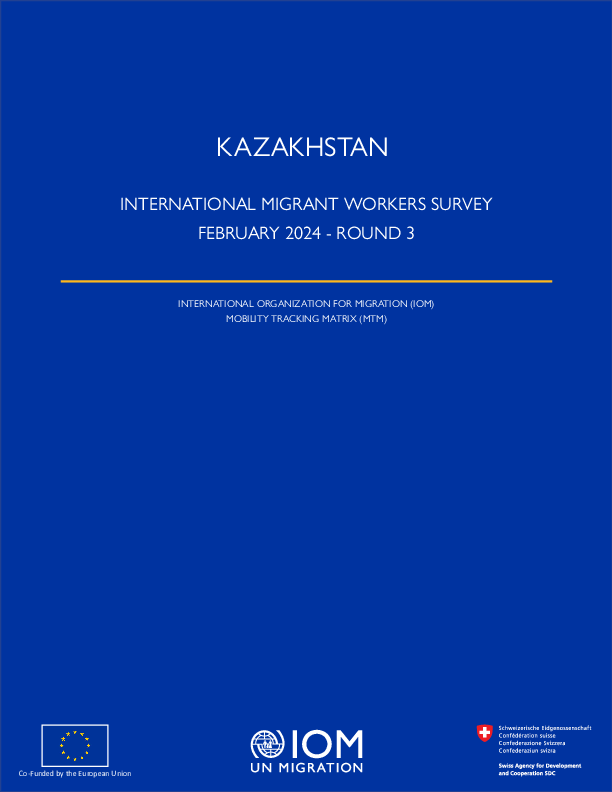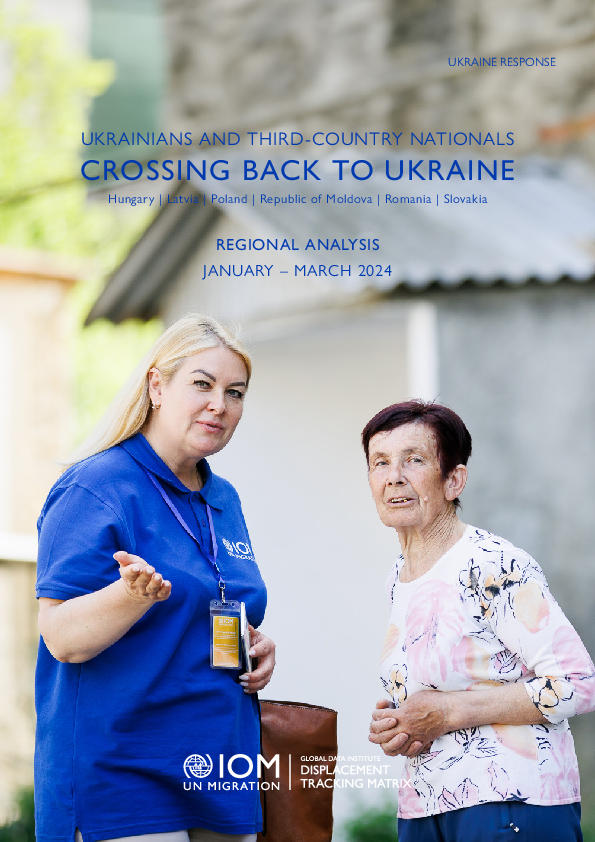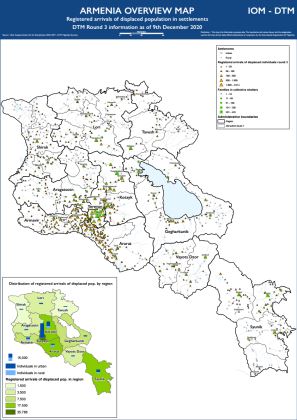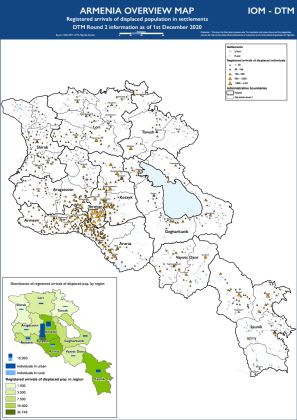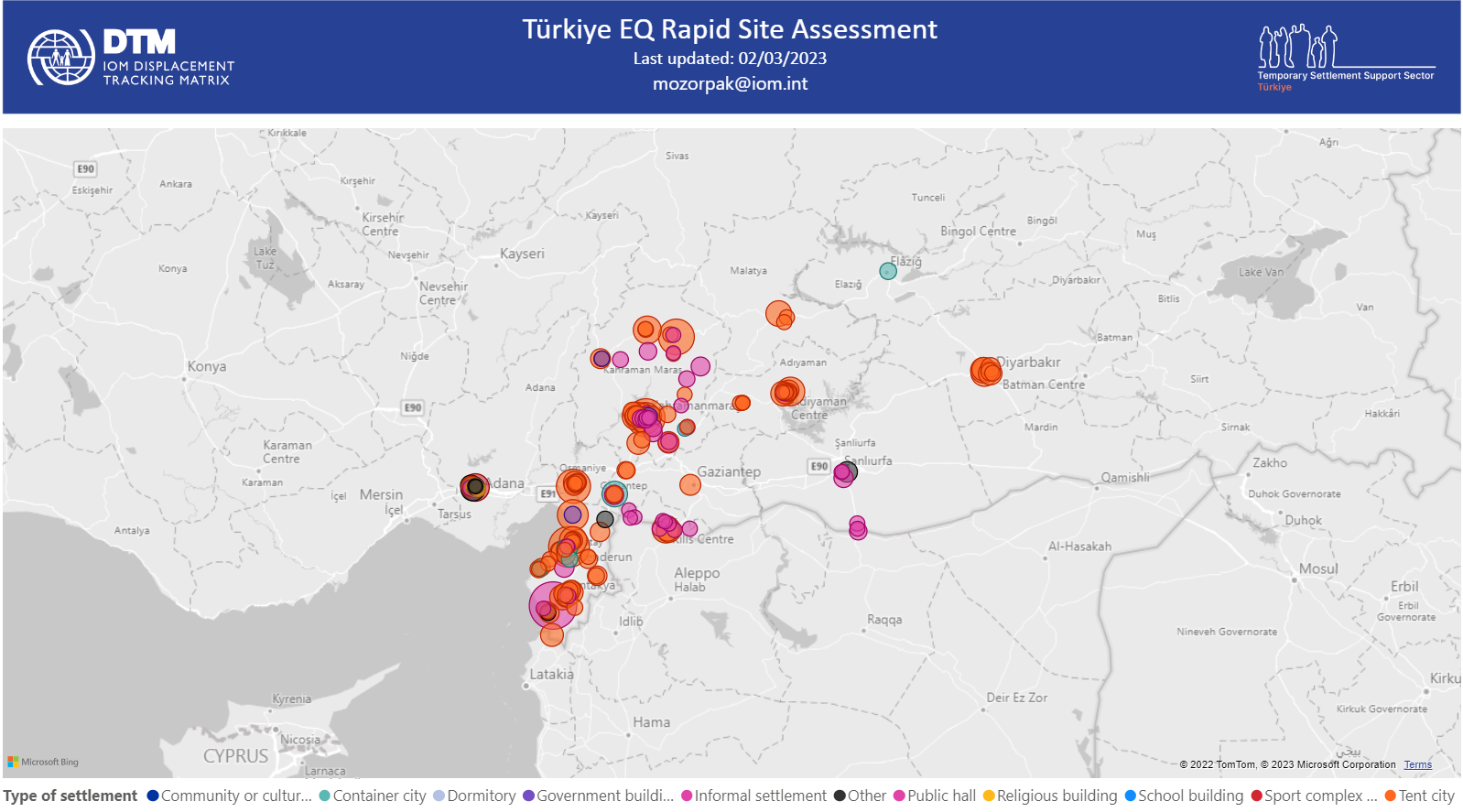-
Countries
-
Data and Analysis
-
Special Focus
-
Crisis Responses
South Eastern Europe, Eastern Europe and Central Asia
DTM South Eastern Europe, Eastern Europe and Central Asia
DTM Operations in the region
- Active DTM operation
- Past DTM operation
Україна — Огляд житлової ситуації в Україні: Умови проживання, вартість оренди та фактори мобільності (липень 2024)
Внаслідок повномасштабного вторгнення Російської Федерації в Україну в лютому 2022 року понад два мільйони одиниць житла було пошкоджено або зруйновано.
Ukraine — Conditions of Return Assessment Factsheet — Round 8 (July 2024)
The Conditions of Return Assessment (CoRA) provides granular and actionable data on the conditions of returns in Ukraine, using a multisectoral location-level assessment (MSLA) methodology conducted with local authority key informants in areas of return across Ukraine.
Казахстан - Базовая Оценка Мобильности Раунд 3 - Январь 2024
Базовая оценка мобильности была проведена в 10 областях, включая 3 города Республиканского значения - г. Шымкент, г. Алматы, г. Астана, а также 1245 сёл, в период с декабря 2023г. по январь 2024г. Во время оценки, было проинтервьюировано 2303 ключевых информаторов.
Казахстан - Международный Опрос Трудящихся-Мигрантов – (Раунд 3)
В ходе третьего раунда опроса международных трудящихся-мигрантов, проведенного в семи регионах и трех провинциальных городах, были опрошены 1810 международных трудящихся-мигрантов.
Uzbekistan — Migration Situation Report — Quarterly Compilation (Jan-Mar 2024)
This report presents the latest available data on recent trends concerning migration issues in Uzbekistan, drawing upon data available for January-March 2024 and providing relevant comparisons on migration trends based on information from national and international datasets that are available to
Казахстан — Отчет о миграционной ситуации №6 (январь – март 2024 г.)
Ежеквартальный отчет был составлен путем объединения вторичных данных, полученных из различных источников, включая государственные органы, международные организации, некоммерческие организации и другие типы организаций.
Україна — ПРОФІЛІ ОБЛАСТЕЙ — Опитування загального населення Раунд 16 (липень 2024)
Профілі областей ґрунтуються на даних раунду 16 Опитування загального населення МОМ, з акцентом на демографічних показниках і переміщенні населення, довгострокових рішеннях, достатності житла, базових потребах, зайнятості та доходах, а також соціальній згуртованості.
Türkiye — Migrant Presence Monitoring — Situation Report (June 2024)
According to the latest figures from the Turkish Presidency of Migration Management (PMM), there are more than 4.4 million foreigners in Türkiye, of whom 3.4 million are seeking international protection. Most of them are Syrians (3,111,0471) who have been granted temporary protection status.
Kazakhstan – International Migrant Workers Survey (Round 3)
The third round of the International Migrant Worker Survey, conducted across seven regions and three provincial cities, interviewed 1,810 international migrant workers.
Ukraine — Pathways for Regular Migration: Perceptions of Migrant Workers and Recovery in Ukraine — July 2024
Pathways for regular migration are an essential component of Ukraine’s recovery, addressing labour shortages and demographic challenges.
Ukraine Response — Regional Analysis — Ukrainians and TCNs Crossing Back to Ukraine (January - March 2024)
This report presents evidence on persons crossing back to Ukraine from abroad distinguishing between those who aim to remain in the country for longer periods and those who plan to pay a short visit.
Ukraine — Housing Brief: Living conditions, rental costs and mobility factors —July 2024
As a result of the full-scale invasion of Ukraine by the Russian Federation in February 2022, more than two million housing units were damaged or destroyed.
Ukraine Response — Regional Analysis — Access to Housing for Refugees from Ukraine (January - March 2024)
IOM’s Displacement Tracking Matrix collected data through Surveys with Refugees in the Ukraine Response region from January to March 2024 in nine countries in Central and Eastern Europe: Czechia,1 Estonia, Hungary, Latvia, Lithuania, Poland,2 Romania, R
Bosnia & Herzegovina — Flow Monitoring Surveys with Migrants Travelling through Bosnia and Herzegovina in 2023 (June-August)
This report presents the results of the fifth round of the Displacement Tracking Matrix (DTM) Flow Monitoring Surveys (FMS) implemented in Bosnia and Herzegovina (BiH). The data was collected from 14 June to 18 August 2023, in four temporary reception centres (TRCs).
Jul 11 2024
Bosnia & Herzegovina — Flow Monitoring Surveys…
МИГРАЦИЯ ЖӨНҮНДӨ МА А ЛЫМАТ ТАРДЫН КЕМЧИЛИГИН АНЫКТОО БОЮНЧА ТАЛДОО (2024 ЯНВАРЬ)
Бул баяндама төмөндөгү методология бөлүмүндө түшүндүрүлгөндөй Миграциялык Маалыматтарды Картага түшүрүү боюнча машыгуу иш-чаранын негизги жыйынтыктарын аныктайт, жана Кыргызстандагы миграция жөнүндө азыркы учурда болгон жеткиликтүү маалыматтарды аныктайт.
Tajikistan – Tajikistan Baseline Mobility Assessment (Round 3)
Mobility Tracking Matrix (MTM) implements the Baseline Mobility Assessment (BMA) in Tajikistan to track mobility, provide information on population estimates, geographic distribution of migrant workers and return migrants, reasons for migration and countries of return.
Kyrgyzstan — Migration Data Gaps Analysis — (January 2024)
This report summarizes the key findings of the Migration Data Mapping Exercise, as explained in the methodology section below, and identifies existing and available migration data in Kyrgyzstan.
Ukraine — Oblast Profiles — General Population Survey Round 16 (July 2024)
The Oblast Profiles draw from data collected during Round 16 of IOM Ukraine’s General Population Survey (GPS), with an emphasis on demographics & displacement, the adoption of coping strategies to meet needs, employment & income, and housing.
Western Balkans — Mixed Migratory Flows Report (May 2024)
Monthly Overview of: Arrivals in the Western Balkans Top three nationalities at arrivals in the reporting month Migrants presence in reception facilities Assisted Voluntary Returns and reintegration
Western Balkans — Мешани Миграциски Текови (мај 2024)
Месечен преглед на: Пристигнувања во Западен Балкан Топ три националности на лица кои пристигнале во месецот на известување Присуство на мигранти во прифатните објекти Доброволно асистирано враќање и реинтеграција
Bosnia & Herzegovina — Migrant Mobility Situation Report (May 2024)
This report provides insights into the profiles, experiences, needs, routes travelled and intentions of migrants transiting through Bosnia and Herzegovina (BiH). Data was collected from 1 to 30 May 2024.
Jul 01 2024
Bosnia & Herzegovina — Migrant Mobility Situat…
Western Balkans — Mješoviti Migracijski Tokovi (Maj 2024)
Mjesečni pregled: Dolasci na Zapadni Balkan Tri najzastupljenije nacionalnosti u izvještajnom mjesecu Prisustvo migranata u prihvatnim centrima Potpomognuti dobrovoljni povratak i reintegracija
Western Balkans — Flukset e Përziera Migratore (Maj 2024)
Përmbledhje mujore të: Arritjet në Ballkanin Perëndimor Tre kombësitë kryesore të arriturëve Prania e migrantëve në qendrat pritëse Kthimet vullnetare dhe të asistuara
Western Balkans — Migrant Mobility Situation Report (May 2024)
This report provides insights into the profiles, experiences, needs, routes travelled and intentions of migrants transiting through the Western Balkans. IOM surveyed 1,307 migrants from 1 May to 31 May 2024 in Albania, Bosnia and Herzegovina, Montenegro, North Macedonia, Serbia and Kosovo*.
Pagination
Tajikistan – Baseline Mobility Assessment - Round 3 (Apr 2024)
Jul 12 2024
<p>The Baseline Mobility Assessment (BMA) was conducted in all five provinces and all 12 districts/cities of Tajikistan (including Ismoili Somoni, Sino, Firdawsi, Shohmansur districts of Dushanbe city, Vahdat city, Rudaki district of Districts of Central Subordination, Khujand city of Sughd…
Ukraine — Area Baseline Assessment — Round 36
Jul 11 2024
<p><strong>Kharkivska (388,118), Dnipropetrovska (373,301), and Kyivska (259,568) Oblasts</strong> have the highest numbers of officially registered IDPs.&nbsp;</p>
Ukraine — Area Baseline Assessment — Round 35
Jul 11 2024
<p><strong>Kharkivska (384,897), Dnipropetrovska (377,837), and Kyivska (300,080) Oblasts</strong> have the highest numbers of officially registered IDPs.&nbsp;</p>
Ukraine — Conditions of Return Assessment Dataset — Round 7 (Feb-Mar 2024)
May 10 2024
<p>The Conditions of Return Assessment is a tool designed to measure the population and severity of conditions in locations of return. The assessment is based on 20 indicators divided into 5 ‘drivers’: (1) livelihoods, (2) utilities and services (3) residential destruction, (4) Safety and…
Ukraine — Mobility and Needs Assessment — Round 7 (March 2024)
Apr 29 2024
<p>IOM's Data and Analytics (D&amp;A) Unit developed the Mobility and Needs Assessment (MaNA), a monthly, multi-sectoral assessment designed to systematically monitor the estimated current presence of key population groups, including de facto Internally Displaced Persons (IDPs),…
Ukraine — Area Baseline Assessment — Round 34
Apr 17 2024
<p>The data collected for the Area Baseline Assessment Round 34 reflects the&nbsp;up-to-date local administrative register of the IDP population as of 31 March 2024, equivalent to a total of <strong>3,387,291 </strong>registered IDPs. Registered IDP figures were collected for…
Kyrgyzstan — Returning Migrant Worker Survey — Round 2
Apr 08 2024
<p>The dataset presents findings from surveys conducted in Kyrgyzstan using the International Organization for Migration's (IOM) Mobility Tracking Matrix (MTM) system. Adapted from IOM's Global Displacement Tracking Matrix (DTM) methodology, MTM aims to collect and analyze data to…
Kyrgyzstan — Baseline Assessment — Round 2
Apr 08 2024
<p>The dataset presents findings from key informant interviews conducted in Kyrgyzstan using the International Organization for Migration's (IOM) Mobility Tracking Matrix (MTM) system. Adapted from IOM's Global Displacement Tracking Matrix (DTM) methodology, MTM aims to collect and…
Ukraine — Mobility and Needs Assessment — Round 6 (February 2024)
Apr 08 2024
<p>IOM's Data and Analytics (D&amp;A) Unit developed the Mobility and Needs Assessment (MaNA), a monthly, multi-sectoral assessment designed to systematically monitor the estimated current presence of key population groups, including de facto Internally Displaced Persons (IDPs),…
Tajikistan – Return Migrant Worker Survey - Round 2
Apr 02 2024
<p>The surveys were conducted with return migrant workers using IOM’s Mobility Tracking Matrix (MTM) system in Tajikistan. The survey locations were selected based on the results of IOM’s Baseline Mobility Assessment on returning migrant workers. The report includes findings on socio-economic…
Ukraine — Mobility and Needs Assessment — Round 1 (Jul-Aug 2023)
Mar 21 2024
<p>During this round of data collection, IOM Ukraine's Data &amp; Analytics Unit conducted assessments in 85 hromadas across 50 raions and 20 oblasts. &nbsp;Assessed hromadas were selected based on their relevance to humanitarian and recovery programming, pre-war population size…
Ukraine — Conditions of Return Assessment Dataset — Round 6 (Nov-Dec 2023)
Mar 21 2024
<p>The Conditions of Return Assessment is a tool designed to measure the population and severity of conditions in locations of return. The assessment is based on 20 indicators divided into 5 ‘drivers’: (1) livelihoods, (2) utilities and services (3) residential destruction, (4) Safety and…
Ukraine — Area Baseline Assessment — Round 33
Mar 19 2024
<p>The data collected for the Area Baseline Assessment Round 33 reflects the&nbsp;up-to-date local administrative register of the IDP population as of 29 February 2024, equivalent to a total of <strong>3,413,472 </strong>registered IDPs. Registered IDP figures were collected…
Ukraine — Area Baseline Assessment — Round 32
Mar 19 2024
<p>The data collected for the Area Baseline Assessment Round 32 reflects the up-to-date local administrative register of the IDP population as of 31 January 2024, equivalent to a total of<strong> 3,509,147</strong> registered IDPs. Registered IDP figures were collected for 1,098…
Tajikistan – Baseline Mobility Assessment - Round 2 (Oct 2023)
Mar 13 2024
<p>Baseline Mobility Assessment (BMA) was conducted in all five provinces and all 12 districts/cities (including Khujand and Khorugh cities, and Rudaki, Kulob, Panj, Vanj, Vahdat, Bokhtar, Firdawsi, Sino, Shohmansur and Ismoili Somoni dsitricts). This assessment covered <strong>919</…
Ukraine — Mobility and Needs Assessment — Round 5 (January 2024)
Mar 08 2024
<p>During this round of data collection, IOM Ukraine's Data &amp; Analytics Unit conducted assessments in <strong>253</strong> hromadas across 72 raions and 23 oblasts and Kyiv City. &nbsp;Assessed hromadas were selected based on their relevance to humanitarian and…
Ukraine — Mobility and Needs Assessment — Round 4 (December 2023)
Feb 07 2024
<p>During this round of data collection, IOM Ukraine's Data &amp; Analytics Unit conducted assessments in <strong>253 hromadas</strong> across 70 raions and 23 oblasts and Kyiv City. &nbsp;Assessed hromadas were selected based on their relevance to humanitarian and…
Ukraine — Area Baseline Assessment — Round 31
Jan 16 2024
<p>The data collected for the Area Baseline Assessment Round 31 reflects the up-to-date local administrative register of the IDP population as of 31 December 2023, equivalent to a total of <strong>3,522,045 registered IDPs</strong>. Registered IDP figures were collected for <…
Ukraine — Mobility and Needs Assessment — Round 3 (November 2023)
Dec 24 2023
<p>IOM's Data and Analytics (D&amp;A) Unit developed the Mobility and Needs Assessment (MaNA), a monthly, multi-sectoral assessment designed to systematically monitor the estimated current presence of key population groups, including de facto Internally Displaced Persons (IDPs),…
Ukraine — Conditions of Return Assessment Dataset — Round 5 (Sep-Oct 2023)
Dec 15 2023
<p>The overarching aim of the Conditions of Return Assessment (CoRA) is to facilitate the development, targeting, and monitoring of conditions that underpin humanitarian, recovery and stabilisation needs in areas of return across Ukraine, by providing: 1. a systematic evidence base updated on…
Pagination
Arrivals Of Displaced Individuals In Settlements Overview - Round 3
This map is representing an overview of arrivals of displaced indivials in settlements of Round 3.Round 3 data was received on 9 December 2020 as export of anonymized individual records from registration database with information on age, sex, shelter, region of origin in NK and current settlement location in ARM.Processed by DTM team (on 9 and 10 December 2020) of IOM in Mobility Tracking, baseline database where population values were summarized for all 593 settlement after location and name verification.Aggregated number for tabulation by settlement and region were generated from DTM database.First release of data is published on DTM website on 11 December 2020Detailed settlement dataset with geographic coordinates and settlement codes (from Armenia statistical office) connected to MS database settlement codes was generated. Geographic reference ArmeniaAdmin 1, source HDX: https://data.humdata.org/dataset/armenia-administrative-boundariesSettlement, source https://ace.aua.am/vector-database-armenia-file-overview/
Arrivals of Displaced Individuals In Settlements Overview - Round 2
This map is representing an overview of arrivals of displaced indivials in settlements of Round 2.Round 1 data from Migration Service, Government of Armenia was received on 17 November 2020 and Round 2 data on 30 November as export from registration database as aggregates on settlement level with population values by settlement name in Armenian language in 11 regional worksheets. Data was processed by DTM team of IOM in Mobility Tracking baseline database where population values were entered each and one individually for all settlements after location and name verification. The map representing the arrivals in settlements is available through the following link: https://displacement.iom.int/maps/arrivals-displaced-individuals-settlements Aggregated number for tabulation by region are generated from DTM database. Detailed settlement dataset with geographic coordinates and settlement codes (from Armenia statistical office) was generated. Geographic reference:Armenia Admin 1,source HDX: https://data.humdata.org/dataset/armenia-administrative-boundaries Settlement, source: https://ace.aua.am/vector-database-armenia-file-overview/
Arrivals of displaced individuals in settlements
This map is representing an overview of arrivals of displaced indivials in settlements.On the morning of 27 September, renewed hostilities erupted in and around the Nagorno-Karabakh conflict zone. This was the latest flare up in a conflict that has been ongoing for over thirty years. On 9 November 2020, the Prime Minister of Armenia, the President of Azerbaijan, and the President of Russia announced a tripartite ceasefire agreement ending the hostilities in and around the Nagorno-Karabakh (NK) conflict zone.While data on the population displaced as a result of the conflict and their needs remains limited, a number of first efforts have been rolled out to assess displacement locations and needs. As the first efforts at collecting information on the needs of displaced and host communities are being rolled out in ten selected districts, an Information Management Working Group has been set up to coordinate efforts, led by the United Nations Resident Coordinator’s Office jointly with UNHCR and with the active participation of IOM. In meantime IOM has received the registration data form the Armenian Migration Service on 17 November 2020 as export from registration database as aggregates on settlement level with population values (of individuals and families) by settlement name. The latest registration data on spontaneous arrivals from the Armenian Migration Services from 17 November 2020 indicate that 81,408 spontaneous arrivals are scattered across 578 settlements and communities. 74 per cent of spontaneous arrivals are currently hosted in urban settlements, while 26 per cent are hosted in rural settlements. 39 per cent of the displaced have been registered in Yerevan, 19 per cent in Kotayk, and 9 per cent in Syunik.IOM will provide support with systematizing and presenting data that is already being collected by the UN agencies and other actors, drawing on its Displacement Tracking Matrix (DTM) tools and has deployed an expert to support this process.








